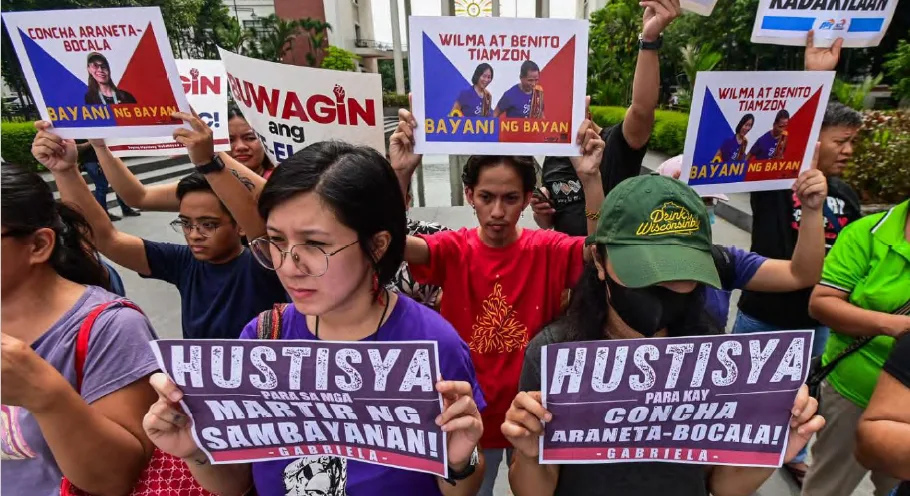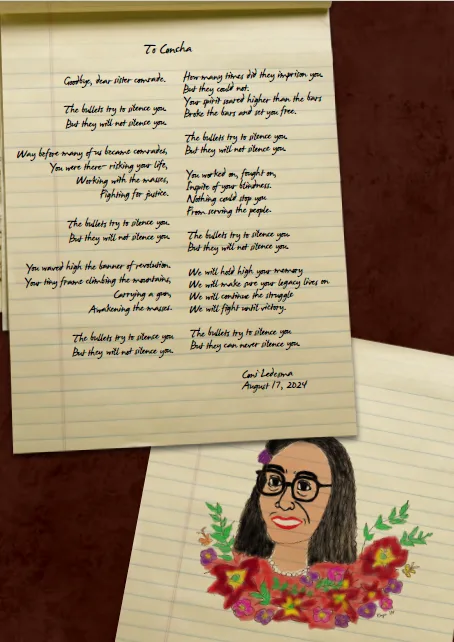Maria Concepcion Araneta – Bocala, or prominently known as Ka Concha or Ka Minay, was a beloved, revered and dedicated revolutionary.
She and ten other guerrilla fighters and revolutionaries were killed during a series of armed encounters with the bloodthirsty fascist troops of the Armed Forces of the Philippines (AFP) from August 5 to 15 in the mountains of Calinog and Lambunao towns, IloIlo province.
Ka Concha is often described by comrades to have a “kikay” flair (stylish person), adorning herself with elegant brooches, pendants, butterfly hairclips, necklaces and always a touch of color on her hair. She fondly referred to these accessories as “remnants of her class origin,” a playful nod to her landlord class background and a reminder of the life she willingly left behind to embrace the path of revolution and sacrifice. Born on August 26, 1950, Ka Concha belonged to the rich and landed Araneta clan in Negros Occidental province. She was the fifth of 10 siblings.
She studied elementary and high school in Iloilo City in 1967 after which she pursued journalism at the University of the Philippines in Diliman, Quezon City. She became a member of the Samahan ng Demokratikong Kabataan (SDK), and actively joined a series of protests in Manila during the First Quarter Storm in 1970.
When Martial Law was declared in 1972, she went underground and joined the New People’s Army. Since then, she remained in the armed movement and took bigger tasks and responsibilities including being a key official of the Communist Party of the Philippines’ (CPP) Regional Committee in Panay, a consultant of the National Democratic Front of the Philippines (NDFP) in peace negotiations and the spokesperson of NDFP – Panay.
During the Party’s rectification movement in the early 1990s, Ka Concha played a key role in keeping the Party intact especially in the urban centers while exposing and isolating revisionists and splittist elements within their ranks. A close comrade of Ka recalls her remarkable resilience when she was nine months pregnant, and they had to transfer from one guerilla zone to the other to escape the pursuing enemy troops. It was a dangerous journey that required traversing the mountain ranges across Panay Island and riding a pump boat to the other side. Her companions were understandably nervous, given she was due to give birth at any day. But Ka Concha remained unfazed despite her delicate condition and the dangers that lurked on their trail. Calm and composed, she reassured her comrades that they would safely reach their destination. This exemplified Ka Concha’s leadership – her ability to inspire comrades through her keen understanding of the objective conditions, allowing her to provide well-informed guidance and decisions that ensured the safety of her comrades even in the most precarious situations.
As a top CPP leader, the military placed an PHP 8 million (US$ 142,000) bounty for her arrest. But despite her leading position within the Party and her huge role in the upsurge of the revolutionary movement in Panay, Ka Concha often downplayed her importance. “Nobody is indispensable and there will always be leaders to take over our work,” she noted in a 2016 interview by the Philippine Daily Inquirer.
Ka Concha endured four arrests in her lifetime. Her first arrest was in Manila in September 1972 before martial law was declared. Then, her second arrest was in Talisay, Negros Occidental in September 1979. A year later on Marcos Sr.’s birthday, she and seven other political detainees managed to escape and rejoin the underground movement. Her third arrest was in April 1987 in her parent’s house in Iloilo City. Her fourth and final arrest, forty-five years later, was in August 2015. She was released in August 2016 to join the peace negotiations in Europe.
Ka Concha served as a consultant of the NDFP for Panay and part of the Reciprocal Working Group on Political and Social Reforms. She was also a member of the Joint Monitoring Committee to monitor the implementation of the Comprehensive Agreement on the Respect for Human Rights and International Humanitarian Law (CARHRIHL).

When Duterte unilaterally terminated the peace negotiations in 2017, Ka Concha went underground once again. Despite her age, Ka Concha remained determined to contribute to the Philippine revolution. “Our participation in the revolutionary struggle cannot be measured by just physical contribution but by what you can contribute even when you age,” Ka Concha stressed.
In 2016, Ka Concha recounted in an interview how she found it difficult at the beginning to accept the necessity of violence in waging revolution. But because of her immersion with the issues of the peasant masses in Panay, she would realize that “revolutionary violence is the necessary form of struggle that the people have to take in defense of their rights and in defense of justice…that’s how I reconciled the issue of revolutionary violence.”
Ka Concha was deeply loved and respected by the peasant masses and the Tumandok people of Panay. Through her tireless efforts, the masses were organized into mutual help groups and cooperatives, fostering unity and solidarity among the peasantry. These groups not only strengthened their agricultural practices by encouraging collective farming but also elevated their political consciousness, allowing them to understand their rights and resist the attacks of enemy troops. Ka Concha’s work empowered the people to take control of their own lives and livelihood, making her an indispensable figure to the communities she served.
Three years prior to her death, she was devastated by the brutal killing of her husband and comrade for 50 years, and fellow NDFP consultant, Reynaldo “Reynaldo “Ka Bading/Minoy” Bocala, who was summarily executed by police and military operatives in Iloilo City on May 29, 2021.
However, Ka Concha’s personal struggles and privileged background did not deter her from fully embracing the armed revolution. Indeed, the death of Ka Concha and ten other martyrs and heroes of Panay is weightier than Mount Madja-as (one of the largest mountains in Panay Island). She is an epitome of revolutionary sacrifice, undying commitment, admirable courage and selfless love for the oppressed people, especially the Tumandok people of Panay whom she served and defended until her very last breath.#
To Concha
Goodbye, dear sister comrade.
The bullets try to silence you.
But they will not silence you.
Way before many of us became comrades,
You were there- risking your life,
Working with the masses,
Fighting for justice.
The bullets try to silence you.
But they will not silence you.
You waved high the banner of revolution.
Your tiny frame climbing the mountains,
Carrying a gun,
Awakening the masses.
The bullets try to silence you
But they will not silence you.
How many times did they imprison you.
But they could not.
Your spirit soared higher than the bars
Broke the bars and set you free.
The bullets try to silence you.
But they will not silence you.
You worked on, fought on,
Inspite of your blindness.
Nothing could stop you
From serving the people.
The bullets try to silence you.
But they will not silence you.
We will hold high your memory
We will make sure your legacy lives on
We will continue the struggle
We will fight until victory.
The bullets try to silence you
But they can never silence you.
Coni Ledesma
August 17, 2024


